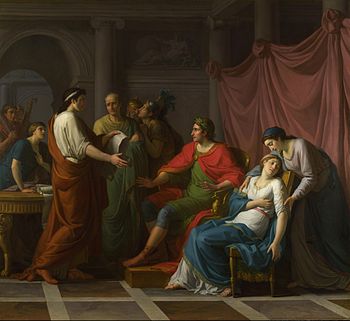This post is following up a point I touched on the recent interview: a possible link between the Acts of the Apostles and the famous founding epic of Rome, Virgil’s Aeneid.

It’s an intriguing idea. I know of a handful of scholars who have published positively about the possibility though I understand most do not accept it. Here are my own reasons for my suspicions that the author of Acts had in part an emulation of the Aeneid in mind. The “in part” qualifier points to indications that the author was interested in depicting the founding of the Christian movement as pointing towards both a New Jerusalem and a New Rome as one.
The Aeneid is an epic poem about Aeneas, a Trojan hero who escaped the city after its capture by the Greeks and after an adventurous westward journey across the Mediterranean in search for a new divinely appointed home he eventually found his way to Italy where he established a new settlement that became the ancestors of the Romans. The epic was widely known and esteemed from the moment of its composition for the ensuing centuries, even among Christians. (We know Christians at least from the time of Lactantius understood Virgil’s poetic hope of child to come to usher in a new golden age was a divinely inspired prophecy of Jesus.) Virgil’s fame extended beyond the literary elite:
Verses and characters from his poetry appear in wall-paintings and graffiti, mosaics and sarcophagi, even the occasional silver spoon, in locations ranging from Somerset to Halicarnassus. (Tarrant, 56)
Monuments to Aeneas became almost as common as those to Romulus in the wake the Aeneid‘s entrance into the world.
The celebrity of Virgil’s works in the Roman world was immediate and lasting. The Aeneid enjoyed the rare distinction of being hailed as a canonical poem while it was still being written: ‘something greater than the Iliad is being born’. . . , wrote the elegist Propertius in the mid-20s, perhaps with a touch of irony, but anticipating the serious comparisons with Homer that would become conventional. (Tarrant, 56)
Poets, story tellers and historians were influenced by Virgil in general and his Aeneid in particular. I’m not referring just to literary style but especially to what Tarrant calls an “ideological engagement” (pp. 63, 64). Subsequent authors would strive to revise or reapply Virgil’s message about the greatness of Rome finding its culmination in the reign of Augustus. One poet adapted Virgil’s message to argue that Nero was the true turning point in Rome’s history. A later historian inverted the Aeneid’s message to reject entirely the dynasty that had produced both Augustus and Nero and to promise a pessimistic future for the empire. Nor was the influence uni-linear. Emulators did not attempt to re-do Virgil’s style but engaged with his ideas and expressed them through a wide spectrum of the styles of other writers, in poetry, drama and prose.
The striking similarities
Despite the above another scholar, John Taylor, believes it is “much less likely” that the author of Acts “knew the Aeneid” but even he acknowledges “striking similarities” in Classics and the Bible: Hospitality and Recognition. I dot-point those he identifies: Continue reading “Acts and Virgil’s Aeneid: comparison and influence”
